外研版(2019)必修第二册Unit 2 Let's celebrate!Listening and Speaking课件(共24张PPT)
文档属性
| 名称 | 外研版(2019)必修第二册Unit 2 Let's celebrate!Listening and Speaking课件(共24张PPT) |
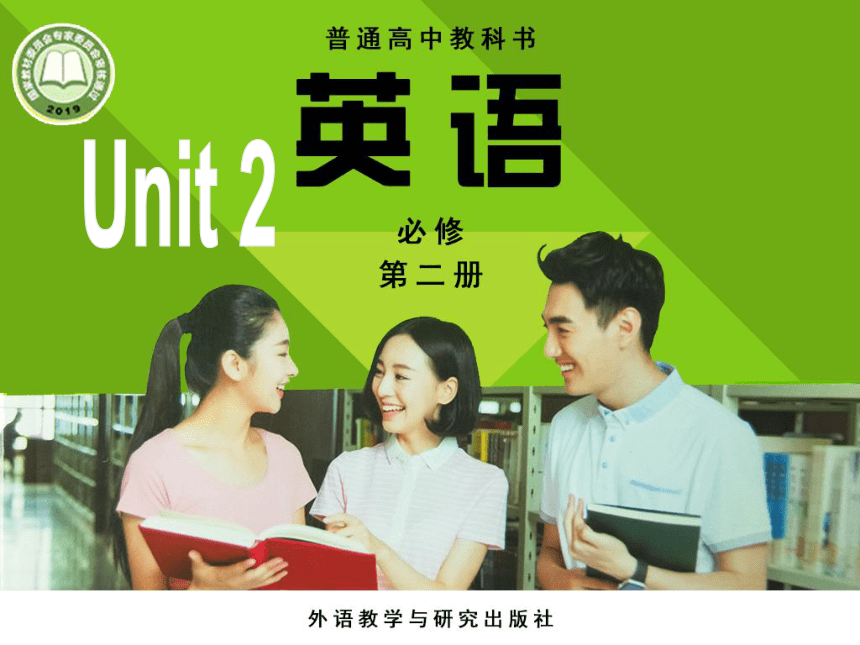
|
|
| 格式 | zip | ||
| 文件大小 | 7.7MB | ||
| 资源类型 | 教案 | ||
| 版本资源 | 外研版(2019) | ||
| 科目 | 英语 | ||
| 更新时间 | 2022-07-11 15:17:58 | ||
图片预览


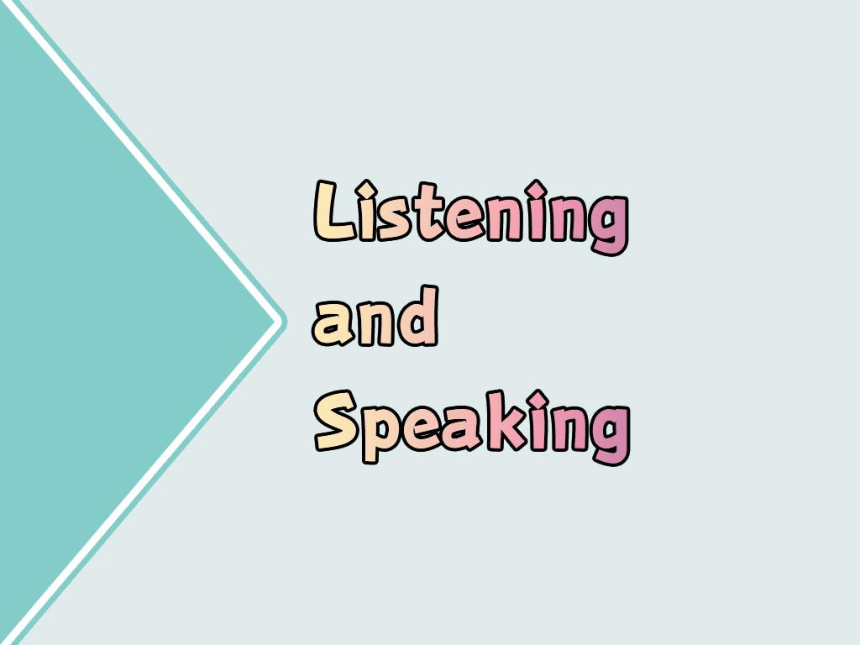

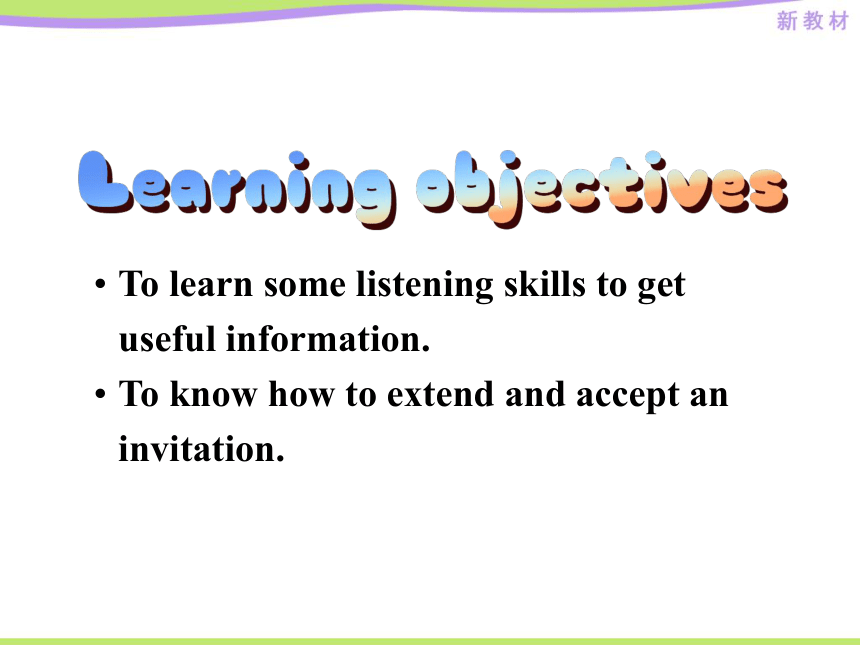
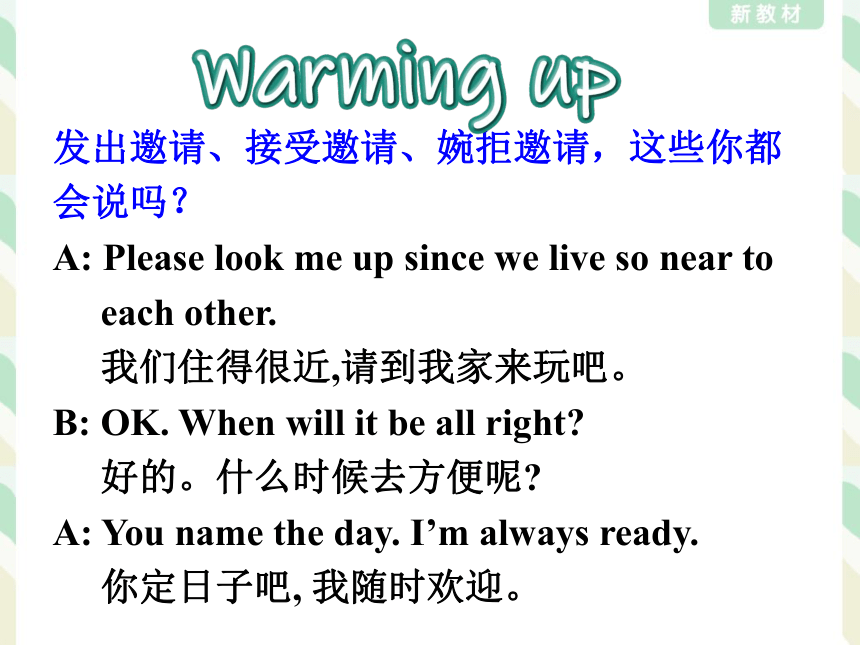
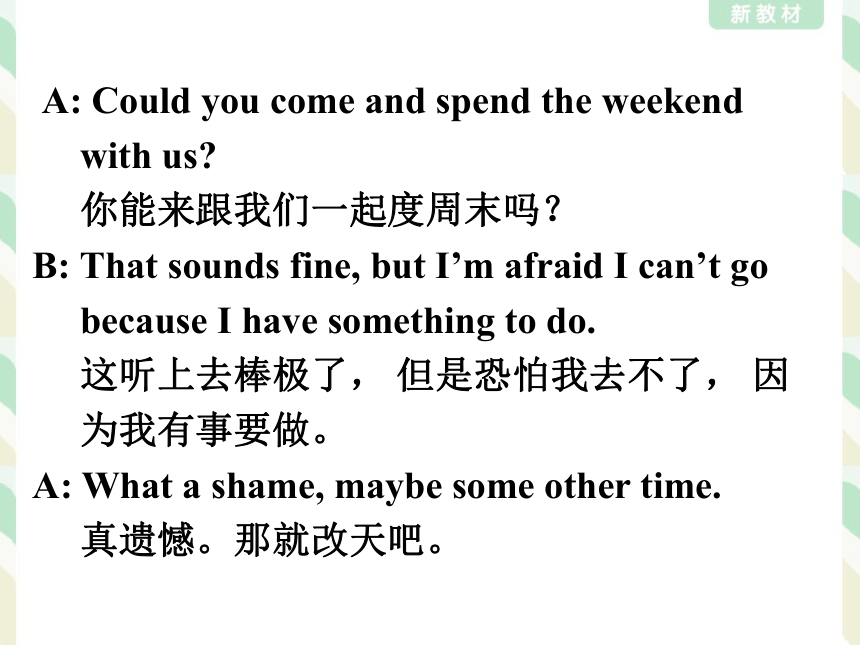
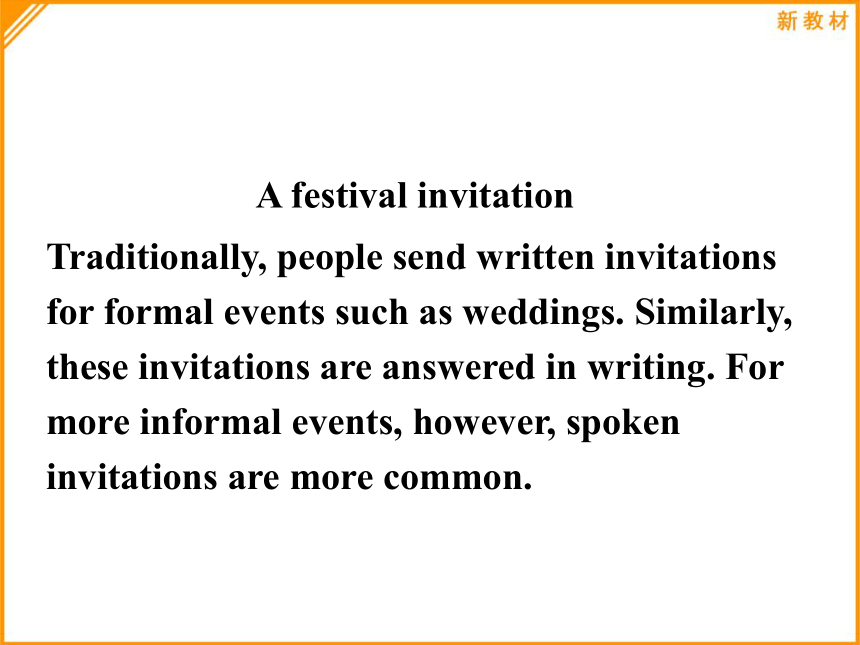
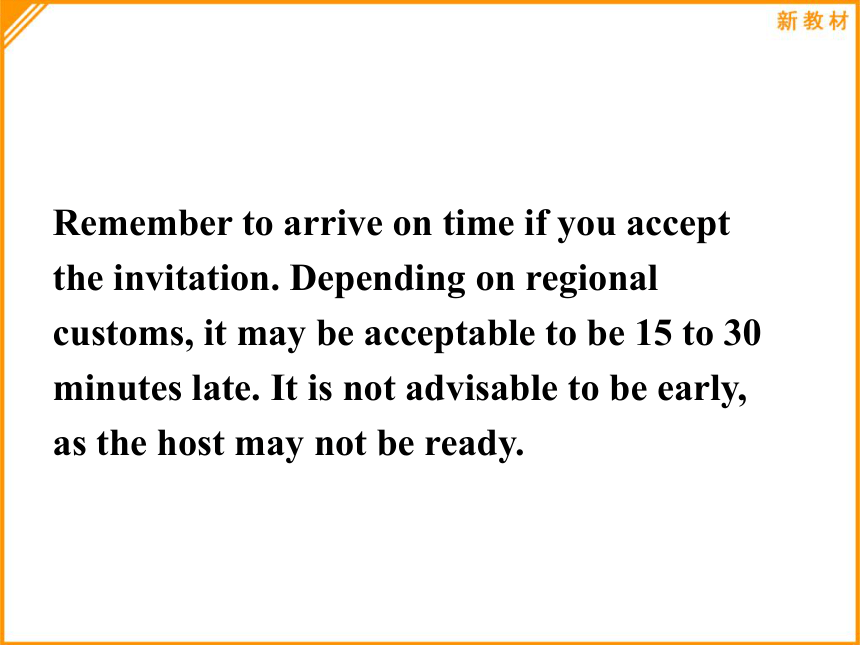
文档简介
(共24张PPT)
Unit 2
Unit 2
Let’s celebrate!
A festival invitation
To learn some listening skills to get useful information.
To know how to extend and accept an invitation.
发出邀请、接受邀请、婉拒邀请,这些你都会说吗?
A: Please look me up since we live so near to
each other.
我们住得很近,请到我家来玩吧。
B: OK. When will it be all right
好的。什么时候去方便呢
A: You name the day. I’m always ready.
你定日子吧, 我随时欢迎。
A: Could you come and spend the weekend
with us
你能来跟我们一起度周末吗?
B: That sounds fine, but I’m afraid I can’t go
because I have something to do.
这听上去棒极了, 但是恐怕我去不了, 因
为我有事要做。
A: What a shame, maybe some other time.
真遗憾。那就改天吧。
A festival invitation
Traditionally, people send written invitations for formal events such as weddings. Similarly, these invitations are answered in writing. For more informal events, however, spoken invitations are more common.
Remember to arrive on time if you accept the invitation. Depending on regional customs, it may be acceptable to be 15 to 30 minutes late. It is not advisable to be early, as the host may not be ready.
Listen to the conversation and complete the sentences with the correct ending.
1. Tony would like to___.
2. Hugo wants to find out ___.
3. On that day they will___.
a go to Hugo’s apartment to give thanks
b invite Hugo to his apartment to celebrate
Thanksgiving
c what he needs to bring to the party
d what he should say at the party
e go shopping together and watch the parade
f watch an American football game on TV
b
c
f
Listen again and complete the notes.
Occasion: a____________ party
When: the fourth_________ in ___________
Where: Tony’s __________
What to eat: a __________with all the side dishes and homemade __________
What to bring: some flowers or __________
What to wear: _________________________
Thanksgiving
Thursday
November
apartment
big turkey
apple pie
candies
anything you like
Tapescripts
Now talk about what the speakers say to extend and accept an invitation. Listen again if necessary.
Work in pairs. Act out the conversation about extending and accepting an invitation.
Student A: You are inviting a teacher from overseas to celebrate a traditional festival. You need to give him/ her the following information:
It’s called the Double Ninth Festival.
It’s on the ninth day of the ninth lunar month.
It’s a traditional Chinese festival celebrating good health and a long life.
It’s a good opportunity to visit elderly relatives.
People celebrate the festival by climbing mountains, appreciating chrysanthemum flowers and drinking chrysanthemum wine.
Remember to wear comfortable walking shoes.
He/ She doesn’t need to bring anything.
It’s called the Double Ninth Festival.
It’s on the ninth day of the ninth lunar month.
It’s a traditional Chinese festival celebrating good health and a long life.
It’s a good opportunity to visit elderly relatives.
People celebrate the festival by climbing mountains, appreciating chrysanthemum flowers and drinking chrysanthemum wine.
Remember to wear comfortable walking shoes.
He/ She doesn’t need to bring anything.
Are you free…
Would you like to …
It’s celebrated for …on …
You can wear…
You can …if you like.
Student B
You are a teacher from overseas working in China. One of your Chinese students invites you to celebrate a traditional festival. Accept the invitation, but ask for the following information:
what the festival is called
when the festival takes place
what it celebrates
what the customs are
what you need to bring
Yes, I’d love to…
When does …
What’s the origin of …
Do I need to…
Should I bring … with me
Think about a similar situation and have a conversation.
When you are extending or accepting an invitation, pay special attention to the following information: the date and time, what to bring, where to meet, etc.
Write an letter that invites a friend from America to attend an art festival held in your school.
Unit 2
Unit 2
Let’s celebrate!
A festival invitation
To learn some listening skills to get useful information.
To know how to extend and accept an invitation.
发出邀请、接受邀请、婉拒邀请,这些你都会说吗?
A: Please look me up since we live so near to
each other.
我们住得很近,请到我家来玩吧。
B: OK. When will it be all right
好的。什么时候去方便呢
A: You name the day. I’m always ready.
你定日子吧, 我随时欢迎。
A: Could you come and spend the weekend
with us
你能来跟我们一起度周末吗?
B: That sounds fine, but I’m afraid I can’t go
because I have something to do.
这听上去棒极了, 但是恐怕我去不了, 因
为我有事要做。
A: What a shame, maybe some other time.
真遗憾。那就改天吧。
A festival invitation
Traditionally, people send written invitations for formal events such as weddings. Similarly, these invitations are answered in writing. For more informal events, however, spoken invitations are more common.
Remember to arrive on time if you accept the invitation. Depending on regional customs, it may be acceptable to be 15 to 30 minutes late. It is not advisable to be early, as the host may not be ready.
Listen to the conversation and complete the sentences with the correct ending.
1. Tony would like to___.
2. Hugo wants to find out ___.
3. On that day they will___.
a go to Hugo’s apartment to give thanks
b invite Hugo to his apartment to celebrate
Thanksgiving
c what he needs to bring to the party
d what he should say at the party
e go shopping together and watch the parade
f watch an American football game on TV
b
c
f
Listen again and complete the notes.
Occasion: a____________ party
When: the fourth_________ in ___________
Where: Tony’s __________
What to eat: a __________with all the side dishes and homemade __________
What to bring: some flowers or __________
What to wear: _________________________
Thanksgiving
Thursday
November
apartment
big turkey
apple pie
candies
anything you like
Tapescripts
Now talk about what the speakers say to extend and accept an invitation. Listen again if necessary.
Work in pairs. Act out the conversation about extending and accepting an invitation.
Student A: You are inviting a teacher from overseas to celebrate a traditional festival. You need to give him/ her the following information:
It’s called the Double Ninth Festival.
It’s on the ninth day of the ninth lunar month.
It’s a traditional Chinese festival celebrating good health and a long life.
It’s a good opportunity to visit elderly relatives.
People celebrate the festival by climbing mountains, appreciating chrysanthemum flowers and drinking chrysanthemum wine.
Remember to wear comfortable walking shoes.
He/ She doesn’t need to bring anything.
It’s called the Double Ninth Festival.
It’s on the ninth day of the ninth lunar month.
It’s a traditional Chinese festival celebrating good health and a long life.
It’s a good opportunity to visit elderly relatives.
People celebrate the festival by climbing mountains, appreciating chrysanthemum flowers and drinking chrysanthemum wine.
Remember to wear comfortable walking shoes.
He/ She doesn’t need to bring anything.
Are you free…
Would you like to …
It’s celebrated for …on …
You can wear…
You can …if you like.
Student B
You are a teacher from overseas working in China. One of your Chinese students invites you to celebrate a traditional festival. Accept the invitation, but ask for the following information:
what the festival is called
when the festival takes place
what it celebrates
what the customs are
what you need to bring
Yes, I’d love to…
When does …
What’s the origin of …
Do I need to…
Should I bring … with me
Think about a similar situation and have a conversation.
When you are extending or accepting an invitation, pay special attention to the following information: the date and time, what to bring, where to meet, etc.
Write an letter that invites a friend from America to attend an art festival held in your school.
